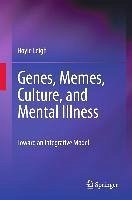
Genes, Memes, Culture, and Mental Illness (eBook, PDF)
Toward an Integrative Model
Versandkostenfrei!
Sofort per Download lieferbar
40,95 €
inkl. MwSt.
Weitere Ausgaben:

PAYBACK Punkte
20 °P sammeln!
What produces mental illness: genes, environment, both,neither? The answer can be found in memes-replicable units of information linking genes and environment in the memory and in culture-whose effects on individual brain development can be benign or toxic. This book reconceptualizes mental disorders as products of stressful gene-meme interactions and introduces a biopsychosocial template for meme-based diagnosis and treatment. A range of therapeutic modalities, both broad-spectrum (meditation) and specific(cognitive-behavioral), for countering negative memes and their replication are consider...
What produces mental illness: genes, environment, both,neither? The answer can be found in memes-replicable units of information linking genes and environment in the memory and in culture-whose effects on individual brain development can be benign or toxic. This book reconceptualizes mental disorders as products of stressful gene-meme interactions and introduces a biopsychosocial template for meme-based diagnosis and treatment. A range of therapeutic modalities, both broad-spectrum (meditation) and specific(cognitive-behavioral), for countering negative memes and their replication are considered, as are possibilities for memetic prevention strategies. In this book, the author outlines the roles of genes and memes in the evolution of the human brain; elucidates the creation, storage, and evolution of memes within individual brains; examines culture as a carrier and supplier of memes to the individual; provides examples of gene-meme interactions that can result in anxiety, depression, and other disorders; proposes a multiaxial gene-meme model for diagnosing mental illness; identifies areas of meme-based prevention for at-risk children; and defines specific syndromes in terms of memetic symptoms, genetic/ memetic development, and meme-based treatment.
Dieser Download kann aus rechtlichen Gründen nur mit Rechnungsadresse in A, B, BG, CY, CZ, D, DK, EW, E, FIN, F, GR, HR, H, IRL, I, LT, L, LR, M, NL, PL, P, R, S, SLO, SK ausgeliefert werden.













